Lesson 13 篇章的翻译:文学文本的翻译
现代大学英语精读3第13课翻译

第十三课军人病1.登陆战于1944年6月在法国展开。
士兵们面朝下趴下,空气中弥漫着各种声音,空中传来刺耳的呼啸声并且随着震耳欲聋的爆炸声而终止。
这可能只是瞬间发生的事情。
倘若声音还在持续不断,你就会看到士兵们用战锹刮去地表土,把自己隐藏在挖出的地洞里,像动物一样从眼前消逝。
2.要么就是士兵们成两路纵队沿着公路。
卧倒在地上。
他们要么分散开,在一大片开阔地上前进。
一道路堤从穿过棗这是一条铁路。
这时传来了一阵短促的刺耳声响,紧接着就是一阵有节奏的轰隆声。
如果你恰好与这些人在一起,听起来就像天空给撕成了碎片。
一个人倒下去,其他人继续往前冲去,时而蜷伏在路基后面作为掩护。
3.这就是1944年夏天一个步兵在法国经历的生或死的考验。
这些动作会不断重复多次……景物会发生变化。
从一排排栽成树篱的灌木分隔开的块块农田,遍布风车的辽阔平原,到白雪皑皑的森林地带。
士兵们穿过座座村落,此时又来到了河岸,乘坐橡皮船渡河。
他们最终又行进在崇山峻岭之中。
4.1945年,我从美国陆军复员,重返大学读书。
我还模糊地记得,我和其他学生一起坐在一间教室里棗只有几个学生围坐在一张长方形桌子旁边,正在讨论这一大本书。
这门课是高年级学生上的,被称作学术报告会。
我在如饥似渴地阅读着各种书籍。
我不读书时便写小说、散文、诗歌……5.接下来我就什么也不知道了。
有个人说,我丢失了和别人公用的公寓房门钥匙,被人发现时已昏倒在门外。
一个朋友在信中告诉我,我一直在大街上徘徊,被警察带走,我还激烈地反抗过。
6.我住进了一间医院的病房。
这不是一家军队医院,而是长岛上的金斯公园。
我认为,这是因为战后退伍军人医院爆满,剩下的人员只好住进别的地方。
7.我的病是在枪林弹雨中连续战斗几个月的结果,现在起了个什么名称?我想,在海湾战争中我们的许多士兵不会得上这种病棗他们没有长期与敌人交火。
越南战争结束后,这种病被称作“精神创伤后遗症”。
在第二次世界大战期间被称为“战斗疲劳症”。
Lesson13课文原文翻译及重点冀教版七年级英语下册
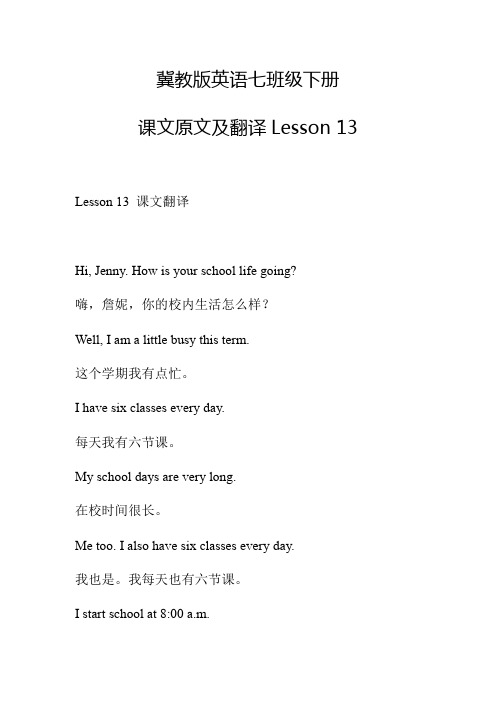
冀教版英语七班级下册课文原文及翻译Lesson 13 Lesson 13 课文翻译Hi, Jenny. How is your school life going?嗨,詹妮,你的校内生活怎么样?Well, I am a little busy this term.这个学期我有点忙。
I have six classes every day.每天我有六节课。
My school days are very long.在校时间很长。
Me too. I also have six classes every day.我也是。
我每天也有六节课。
I start school at 8:00 a.m.我早上八点钟上课。
I usually finish at 5:00 p.m.通常下午五点放学It's a long day, but I like my school.漫长的一天,但是我喜爱我的学校。
My school subjects are so interesting.我们的学科都很好玩。
What subjects do you have?你学哪些课程?I have Chinese, English, math, history and some others.我学习语文,英语,数学,历史和其他科目。
P.E. is my favourite.我最喜爱体育课。
We always have a big sports meet twice a year.我们通常每两年进行一次大型运动会。
I often take part in the long jump.我常常参与跳远活动。
Last term I won first place!上学期我得了第一名!Wow! You're good at the long jump.哇!我擅长跳远。
Yeah! Thank you!是的,感谢!What subjects do you have?你学哪些课程?I have social studies, shop, math, French, English and art.我有社会讨论课,手工艺课,数学课,法语课,英语课和美术课。
新概念第一册课文翻译及学习笔记【Lesson13、15、17】

【导语】新概念英语作为⼀套世界闻名的英语教程,以其全新的教学理念,有趣的课⽂内容和全⾯的技能训练,深受⼴⼤英语学习者的欢迎和喜爱。
为了⽅便同学们的学习,为⼤家整理了⾯的新概念第⼀册课⽂翻译及学习笔记,希望为⼤家的新概念英语学习提供帮助!Lesson13 【课⽂】 LOUISE: What colour's your new dress? ANNA: It's green. ANNA: Come upstairs and see it. LOUISE: Thank you. ANNA: Look! Here it is! LOUISE: That's a nice dress. It's very smart. ANNA: My hat's new, too. LOUISE: What colour is it? ANNA: It's the same colour. It's green, too. LOUISE: That is a lovely hat! 【课⽂翻译】 路易丝:你的新⾐裙是什么颜⾊的? 安娜:是绿⾊的。
安娜:到楼上来看看吧。
路易丝:谢谢。
安娜:瞧,就是这件。
路易丝:这件连⾐裙真好,真漂亮。
安娜:我的帽⼦也是新的。
路易丝:是什么颜⾊的? 安娜:⼀样的颜⾊,也是绿的。
路易丝:真是⼀顶可爱的帽⼦! 【⽣词】 colour n. 颜⾊ green adj. 绿⾊ come v. 来 upstairs adv. 楼上 smart adj. 时髦的,巧妙的 hat n. 帽⼦ same adj. 相同的 lovely adj. 可爱的,秀丽的 【知识点讲解】 1. 在上⼀课,我们已经为⼤家补充了很多种颜⾊的说法,今天这⼀课以及其后的练习课14课中,我们还将学到⼀些新的颜⾊:⽐如grey,灰⾊的;brown,棕⾊的,等等。
综合教程1 unit 13 课文翻译

Unit 13 The Light of DepressionSection One Pre-reading Activities (2)I. Reading aloud (2)II. Cultural information (2)III. Audiovisual supplements (3)Section Two Global Reading (4)I. Main idea (4)II. Structural analysis (4)Section Three Detailed Reading (5)Text I (5)Section Four Consolidation Activities (16)I. Vocabulary Analysis (16)II. Grammar Exercises (20)III. Translation exercises (23)IV. Exercises for integrated skills (24)V. Oral activities (25)VI. Writing Practice (26)VII. Listening Exercises (28)Section Five Further Enhancement (30)I. Text II (30)II. Memorable Quotes (33)Section One Pre-reading ActivitiesI. Reading aloudRead the following sentences aloud, paying special attention to intonation. The symbol | indicates a division of tone units, while ↗ and ↘ nuclear tones.1. When we arrived at the ↗hospital, | my dad walked around to her side of the ↗car, | gathered her into his arms ↗and ↘held her.2. At a ↗time in my ↗life | when the world was supposed to be opening up to ↗me, | I ↗found myself re ↘treating.3. They regarded it as a ↘bad case | of the ↘Sunday evening blues, | believing that if I ↗tried harder | and ↘stopped feeling sorry for my ↗self, | I would ―get ↘better.‖4. And ↗slowly, | the desire to ↘live, | the ↘courage to want to live, | began to re ↘turn.II. Cultural information1. QuoteW. M. Thackeray: Dare and the world always yields. If it beats you sometimes, dare it again and again and it will succumb.2. DepressionSome people say that depression feels like a black curtain of despair coming down over their lives. Many people feel like they have no energy and can't concentrate. Others feel irritable all the time for no apparent reason.Most people who have gone through one episode of depression will, sooner or later, have another one. The symptoms vary from person to person, but if you feel "down" for more than two weeks, and these feelings are interfering with your daily life, you may be clinically depressed.The common symptoms including:*poor concentration and memory*withdrawal from social situations and activities*an inability to experience pleasure in activities that were formerly enjoyed*preoccupied with thoughts and feelings of worthlessness, helplessness, self-hatred, etc.*thoughts of death or suicide, etc.Learning to recognize these early triggers or symptoms and working with your doctor will help to keep the depression from worsening. There are many forms of treatment that can help you cope with depression, including medications, psychotherapy or counseling.III. Audiovisual supplementsWatch a video clip and answer the following question.What impressed you in the video?Answer to the Question:We can see that the father and son have to stay in the toilet for the night, which means they were experiencing a hard time in life. But at the beginning, they were playing games on the subway platform. Actually, the father in the video was facing the difficulties with a positive attitude to life.Video Script:Chris: Look around! Look at all these dinosaurs!Christopher: Wow~!Chris: Can you see them?Christopher: Yeah!Chris: Wait! Come on! Come on! Wait! Watch out!Christopher: What is it?Chris:Don’t step in the fire! We’re cavemen. We need this fire, because there’s no electricity and it’s cold out here, Ok?Christopher: Watch out! Watch out!Chris: Whoa! Oh, my goodness … A.T. rex! Get your stuff! Get your stuff! Get it! We gotta find someplace safe.Christopher: Like what?Chris: Em … We need a cave.Christopher: A cave?Chris: We gotta find a cave. Come on.Christopher: Ok.Chris: Come on. Come on. Watch your back! Look out! Here it is! H ere’s a cave. Come on! Right here! Right here! Go, go, go! Go ahead. Get in! Hurry, hurry, hurry!Christopher: Are we safe?Chris: Yeah, I think so.Section Two Global ReadingI. Main ideaWhat is the story narrated in the text about?This narrative essay narrates and describes an unusual and unforgettable phase of the writer’s life, during which she experienced deep depression, voluntarily received clinical treatment, conquered the illness in the end, and benefited a great deal from the experiences associated with her suffering.II. Structural analysis1. How are the events of the essay arranged?The narration mostly follows a chronological order, but a few flashbacks are inserted in Paragraph 3 and 6.2. Work out the structure of the text by completing the table.Paragraph(s) Main idea1-3 It provides the background of the story, telling us about the writer and her family and her problem.4-10 The writer related her experiences with deep depression, including her attitude and reactions to it, focusing on her positive attitude and how she got better andfinally recovered.11 It describes the writer’s mood and feeling on a moon-lit, starry night, andstresses that her deep depression had been worth it, for suffering had paintedcolor into her life, and that she was thankful.Section Three Detailed ReadingText IThe Light of DepressionAlice Johnson1.Twice, I have seen my father cry. The first time, I was 12, and my sister, Jenny, was Shewas diagnosed with juvenile diabetes and needed further testing. When we arrived at the hospital, my dad walked around to her side of the car, gathered her into his arms and held her.None of us understood what was happening to my sister’s body, but when I heard my strong dad’s voice break with tears, I knew we were on a new and unexpected path.2.Almost 10 years later, in the fall following my college graduation, I was the one myfather gathered into his arms. At 22, I was diagnosed with clinical depression and voluntarily admitted to a psychiatric hospital. At a time in my life when the world was supposed to be opening up to me, I found myself retreating. Apathetic, uncaring, tired, and with no particular vision for any future, I drifted into a world without hope. My family and I knew I needed help.3.As a child, I had great passion for life. The simplest of pleasures brought unexplainablejoy. I seldom demonstrated a melancholic personality. In fact, my parents learned that birthdays, Christmas and any reason for celebration would find me in excitement. I loved life, and I loved being alive. When depression struck, I was dropped into a world where wearing my own skin was foreign and ill-fitting.4.My mom says that one of the hardest days of her life was the day I checked into thehospital. My personal belongings were rummaged through, and I headed down the long hallway to doctors and a treatment team that became my ―family‖ for the next month. Her drive home, leaving me behind, was heartbreaking. She was left to wonder and guess at why her daughter was in so much pain and why she couldn’t fix it this time.5.I was numb, trying to see through a haze that had settled upon what once was vivid andbright. All color had seeped from a life that used to hold such joy. Some peopl e didn’t understand my depression. They regarded it as a bad case of the Sunday evening blues believing that if I tried harder and stopped feeling sorry for myself, I would ―get better.‖ But I wasn’t just dealing with apathy toward routine.I couldn’t remedy being sick with a strenuous run, a good movie, or simply the passing of time. Depression transcended my circumstances and invaded my soul. It was more like a day terror —like waking up to a nightmare. Clinical depression painted my world black while screaming quietly that I was worthless.6.I remember driving home from work the week before I checked into the hospital. Myco-workers hadn’t noticed any difference in my performance or behavior. I was great at keeping up appearances. I was good at performing. But that evening, I recall wishing I weren’t alive, wishing my car would turn down an empty road and I could disappear. Upon arriving home, I headed straight for my room and slipped under my covers, hoping to sleep. I wanted to escape life because it hurt to breathe.7.By the end of my first week at the hospital, I had made up my mind to leave. It wasn’tworking. I packed my bags, headed to the front desk, and announced that I was calling my parents to come and pick me up. But my treatment team told me I needed to stay. Defeated and scared, I returned to my room, unpacked my bags and cried myself to sleep. It was time to get honest with myself.8.I was angry. Me, happy Alice, with so much going for her. Stripped of the world’saccolades, it didn’t m atter what school I had attended, where I had vacationed, what awards I had won. It didn’t matter who I knew, didn’t know, or thought I knew. What mattered to those surrounding me was that I was honest about my feelings. They didn’t have to be pretty. I di dn’t have to look good. I could just be — and that was enough.9.It was the kindness, sympathy, love and truth demonstrated in the hospital that beganunlocking my wounds, hurts and distorted thinking. I was learning from the worn lives around me. Lives I would have once felt pity for or wanted to distance myself from. They were the ones who possessed strength and courage. They had suffered abuse, neglect, addiction and illnesses. They felt misplaced and forgotten; they were told they didn’t matter. I cam e from a family filled with love, but as I and others in my hospital ―family‖ shared our suffering, I found I needed their love.10.Getting help and getting rid of the junk cluttering my mind were part of getting better.Hope came gradually, and with small steps slowly returned feeling and clarity. I was changing.My thinking was being altered.I was given a truer sense of who I was: a young woman who needed to be loved for herself, not for what she could offer — not for how she could make you feel. Being honest in the hidden places of my heart. Taking personal responsibility. And slowly, the desire to live, the courage to want to live, began to return. Once truth reveals deception, the lie can no longer deceive unless we choose to let it.11. A year and a half after my release from the hospital, I drove along a country road. Themoon was bright. The stars brighter. Snow gave a fresh milky coat to the trees, and the night air was full and dark. I felt so alive. I hadn’t believed there would ever be something good enough or rich enough to make up for the pain and darkness I had known. My pain had been deep. But on this quiet stretch of road, I knew it had all been worth it. I knew that life was different because of my experience. Suffering had painted color into my life, and I could be thankful.Paragraphs 1-3Questions1. The writer stresses at the very beginning that when her sister was suffering from juvenile diabetes, her father cried bitterly for the first time. When do you think her father cried for the second time? (Paragraph 2)It is not difficult to infer that the writer’s father cried for the second time when the writer was diagnosed with clinical depression.2. Would you describe the writer’s personality as a child before she was seized with depre ssion? (Paragraph 3)As a child, the writer had a great passion for life and enjoyed being alive. The simplest of pleasures brought her great joy. She seldom demonstrated a melancholic personality. Any reason for celebration would find her in great excitement.Words and Expressions1. diagnose:v.1) find out the nature of an illness by observing its symptomse.g. The illness was diagnosed as measles.2) find out what the cause of a fault is, after doing tests, examinations, etc.e.g. The book diagnoses our present economic ills, explaining what is wrong with the economy. Derivation:diagnosis: n.Collocations:diagnose sb. as (having) sth.e.g. Joe struggled in school before he was diagnosed as dyslexic.diagnose sth. as sth.e.g. The illness was diagnosed as mumps.diagnose sb.with sth.e.g. She was diagnosed with breast cancer.Translation:The doctor has diagnosed the illness as heart disease.医生把此病诊断为心脏病。
新概念第二册课文翻译及学习笔记【Lesson13、14、15】
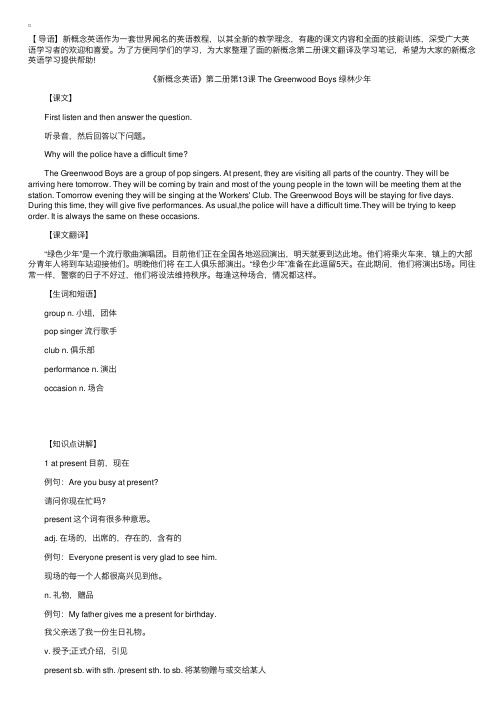
【导语】新概念英语作为⼀套世界闻名的英语教程,以其全新的教学理念,有趣的课⽂内容和全⾯的技能训练,深受⼴⼤英语学习者的欢迎和喜爱。
为了⽅便同学们的学习,为⼤家整理了⾯的新概念第⼆册课⽂翻译及学习笔记,希望为⼤家的新概念英语学习提供帮助!《新概念英语》第⼆册第13课 The Greenwood Boys 绿林少年【课⽂】First listen and then answer the question.听录⾳,然后回答以下问题。
Why will the police have a difficult time?The Greenwood Boys are a group of pop singers. At present, they are visiting all parts of the country. They will be arriving here tomorrow. They will be coming by train and most of the young people in the town will be meeting them at the station. Tomorrow evening they will be singing at the Workers' Club. The Greenwood Boys will be staying for five days. During this time, they will give five performances. As usual,the police will have a difficult time.They will be trying to keep order. It is always the same on these occasions.【课⽂翻译】“绿⾊少年”是⼀个流⾏歌曲演唱团。
五年级下册英语第13课
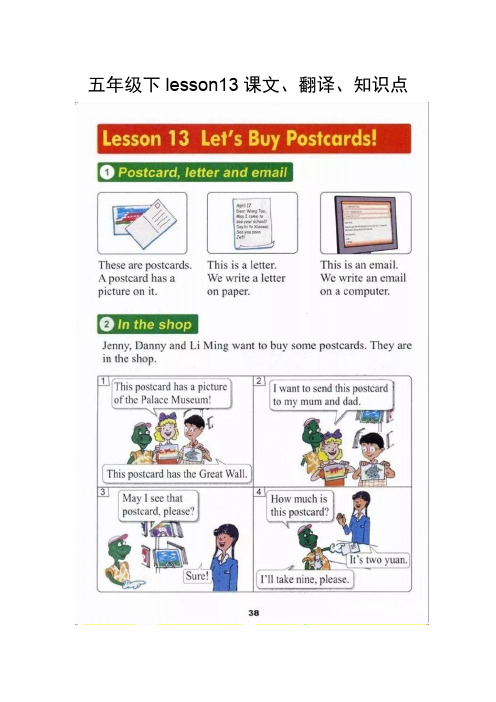
五年级下lesson13课文、翻译、知识点课文翻译第十三课:让我们买明信片1、明信片,信和电子邮件这些是明信片。
一张明信片上有一幅画。
这是信。
我们在纸上写信。
这是电子邮件。
我们在电脑上写电子邮件。
2、在商店里Jenny,Danny和李明想买一些明信片。
他们在商店里。
这张明信片上有一张故宫的图片!这张明信片有长城。
我想把这张明信片寄给我的妈妈和爸爸。
我可以看看那张明信片吗?当然!这张明信片多少钱?两元。
我要买9张。
重点句型I want to send this postcard to my mum and dad.我想把这张明信片寄给我的妈妈和爸爸句型结构:I want to send+某物+to+某人.我想把……寄给……解析:句型"I want to send+某物+to+某人.”want意为“想要”,后面接动词不定式。
send意为“邮寄、发送”例句:I want to send this letter to my friend.我想把这封信寄给我的朋友。
How much is this postcard?这张明信片多少钱?句型结构:How much+is/are+主语?多少钱?解析:句型How much+is/are+主语?",意为“……多少钱”,用于询问某(些)物的价格。
答语通常用句型“主语+is/are+钱数.”或直接回答钱数即可。
注意:how much除了可以询问价格外,还可以用来询问不可数名词的量,意为“多少”。
例句:How much is the book?这本书多少钱?。
高级英语下lesson 13课文翻译
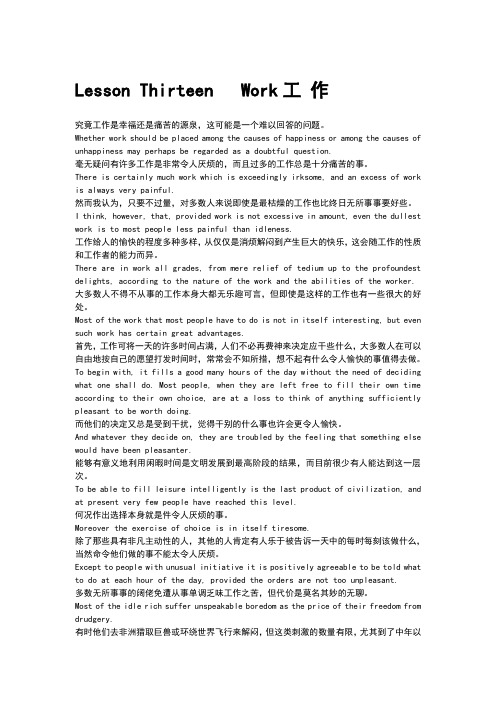
Lesson Thirteen Work工作究竟工作是幸福还是痛苦的源泉,这可能是一个难以回答的问题。
Whether work should be placed among the causes of happiness or among the causes of unhappiness may perhaps be regarded as a doubtful question.毫无疑问有许多工作是非常令人厌烦的,而且过多的工作总是十分痛苦的事。
There is certainly much work which is exceedingly irksome, and an excess of work is always very painful.然而我认为,只要不过量,对多数人来说即使是最枯燥的工作也比终日无所事事要好些。
I think, however, that, provided work is not excessive in amount, even the dullest work is to most people less painful than idleness.工作给人的愉快的程度多种多样,从仅仅是消烦解闷到产生巨大的快乐,这会随工作的性质和工作者的能力而异。
There are in work all grades, from mere relief of tedium up to the profoundest delights, according to the nature of the work and the abilities of the worker. 大多数人不得不从事的工作本身大都无乐趣可言,但即使是这样的工作也有一些很大的好处。
Most of the work that most people have to do is not in itself interesting, but even such work has certain great advantages.首先,工作可将一天的许多时间占满,人们不必再费神来决定应干些什么,大多数人在可以自由地按自己的愿望打发时间时,常常会不知所措,想不起有什么令人愉快的事值得去做。
人教新版英语六年级上册第三单元中文翻译
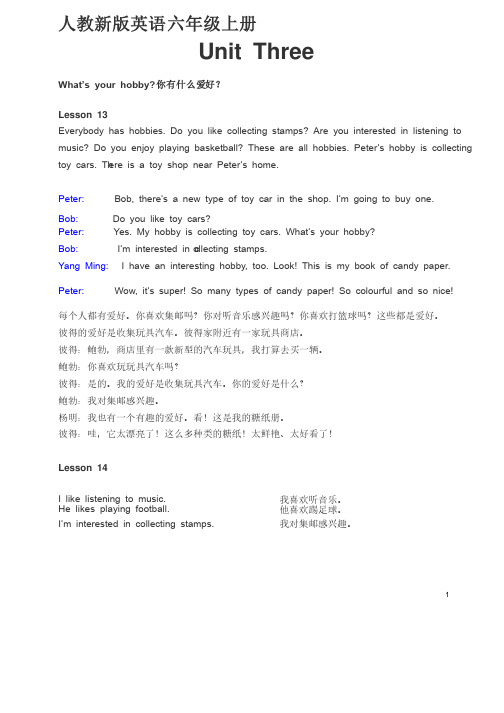
人教新版英语六年级上册Unit ThreeWhat’s your hobby? 你有什么爱好?Lesson 13Everybody has hobbies. Do you like collecting stamps? Are you interested in listening to music? Do you enjoy playing basketball? These are all hobbies. Peter’s hobby is collecting toy cars. Th ere is a toy shop near Peter’s home. Peter: Bob, there’s a new type of toy car in the shop. I’m going to buy one. Bob: Do you like toy cars? Peter: Yes. My hobby is collecting toy cars. What’s your hobby? Bob: I’m interested in c ollecting stamps. Yang Ming: I have an interesting hobby, too. Look! This is my book of candy paper. Peter: Wow, it’s super! So many types of candy paper! So colourful and so nice!每个人都有爱好。
你喜欢集邮吗?你对听音乐感兴趣吗?你喜欢打篮球吗?这些都是爱好。
彼得的爱好是收集玩具汽车。
彼得家附近有一家玩具商店。
彼得:鲍勃,商店里有一款新型的汽车玩具,我打算去买一辆。
鲍勃:你喜欢玩玩具汽车吗?彼得:是的。
我的爱好是收集玩具汽车。
你的爱好是什么?鲍勃:我对集邮感兴趣。
杨明:我也有一个有趣的爱好。
- 1、下载文档前请自行甄别文档内容的完整性,平台不提供额外的编辑、内容补充、找答案等附加服务。
- 2、"仅部分预览"的文档,不可在线预览部分如存在完整性等问题,可反馈申请退款(可完整预览的文档不适用该条件!)。
- 3、如文档侵犯您的权益,请联系客服反馈,我们会尽快为您处理(人工客服工作时间:9:00-18:30)。
事情可不能由这儿说起,得打头来。
open the ball:作为开头 ball:作为开头 But this isn’t the way to open the ball . isn’ We should go the whole animal.
先交代我自己吧。 先交代我自己吧。我 what not:诸如此类 not: 是个算命的先生, 是个算命的先生,我 的东西 也卖过酸枣、 也卖过酸枣、落花生 gal:( :(口 什么的。 什么的。那可是先前 old gal:(口)老伴 的事了。 的事了。现在我在街 kicked up one’s one’ 上摆卦摊儿;好了呢, 上摆卦摊儿;好了呢, heels :(俚) 死 一天也抓弄三毛五毛 人力车, 老伴儿早死啦, 的。老伴儿早死啦, rickshaw :人力车, 儿子拉洋车。 儿子拉洋车。我们爷 黄包车 儿俩住着柳家大院的 一间北房。 一间北房。
cry cupboard 〔口语〕 口语〕 喊饿,想吃东西。 喊饿,想吃东西。
译文赏析
首先,译文在措辞上的特征主要表现在以 下几个方面: 第一, 俚俗语的大量运用 译文中随处可见的俚语、诅咒语、口头语 的运用,无疑是其最显著的风格特点:
第二, 译文中除少数多音节词之外,大都 是单音节或双音节的词,基本上找不到抽 象名词。 第三, 省略词比较多,如:isn’t, 省略词比较多,如:isn’ That’ ,haven’ one’ won’ That’s ,haven’t, one’s, won’t, there’ there’s .
再从语法和句式运用的角度分析, 再从语法和句式运用的角度分析,老舍句式灵活 多样,多用短句,字数不拘,少到三个、四个、 多样,多用短句,字数不拘,少到三个、四个、 五个、六个不等,最多也不超过十六个字, 五个、六个不等,最多也不超过十六个字,如: 三个:好了呢;不说呢; 三个:好了呢;不说呢; 四个:出了人命;得打头来;也没什么; 四个:出了人命;得打头来;也没什么;大家见 透着和气;谁说得清; 面;透着和气;谁说得清; 五个:儿子拉洋车; 五个:儿子拉洋车; 六个:明儿个又搬走;可得吃饱啦; 六个:明儿个又搬走;可得吃饱啦;王家住着两 间房; 间房; 十六个:我们爷儿俩住着柳家大院的一间北房; 十六个:我们爷儿俩住着柳家大院的一间北房; 由于短句具有简洁、明快、活泼、轻松的特点, 由于短句具有简洁、明快、活泼、轻松的特点, 语句组织疏松而清爽,语气和缓而随意, 语句组织疏松而清爽,语气和缓而随意,能给人 以如话家常般的轻松感和亲切感,所以读起来使 以如话家常般的轻松感和亲切感, 人如闻其声,似乎作品主人公正娓娓道来。 人如闻其声,似乎作品主人公正娓娓道来。
大家见面,招呼声“吃了吗? 大家见面,招呼声“吃了吗?”透着 和气,不说呢,也没什么。 和气,不说呢,也没什么。
When people meet , they greet each other with a “How do you do ?”, ?” just to show their good neighbourly feelings. But if they should cut each other dead , nobody would care.
大家一天到晚为嘴奔命, 大家一天到晚为嘴奔命, 没有工夫扯闲盘儿。 没有工夫扯闲盘儿。爱说 话的自然也有。 话的自然也有。可得先吃 饱啦。 饱啦。 When one’s knocked one’ about from pillar to post for his bread day in and day out , he won’ won’t find ginger enough for gas and gaiters. Of course , there’ there’s those who are all jaw like a sheep’ sheep’s head among us. But one can hardly be in a mood for ragragchewing when one’s one’ guts cry cupboard .
cut sb. dead:不理睬某人 dead: knock about :(口)漂泊, :(口 漂泊, 游荡 from pillar to post :四处奔 走着,到处碰壁地, 走着,到处碰壁地, for his bread (俚) =for his (俚 money day in and day out :日复一 日,每天不间断地 ginger :(口)活力,劲头 :(口 活力, gas :(俚)令人非常满意 :(俚 或愉快的)的事(或人) (或愉快的)的事(或人) be all jaw (like a sheep’s sheep’ head) : 全是空话,废话连篇 全是空话, guts:( 用作单) guts:( 用作单)贪食者
这两天我们大院里又透着热闹,出 这两天我们大院里又透着热闹, 了人命。 了人命。
kick-up:有了问题,出了毛病 kick-up:有了问题,出了毛病 A pretty kick-up has been the order of the kickday again in our compound lately , for a life has been lost.
译文言语风格分析
翻译的风格化是由原著的风格决定的,作者运笔典雅,译 者就要坚决杜绝粗俗,反之亦然。正如王佐良先生说: “一切照原作,雅俗如之,深浅如之,口气如之。” 一切照原作,雅俗如之,深浅如之,口气如之。” 评述译文的风格,主要就是看它是否最大限度地再现了原 文的风格。老舍的语言是自然流畅,通俗易懂的,毫无晦 涩之感,译文也应运用相应的风格传达这种感觉。另外, 由于英汉语言体系的不同,各种体系的语言在表达习惯、 语法结构方面又是独具特色的,因此,在翻译中不可以照 搬原文句式,过分受原文结构的束缚,完全对号入座,否 则译文就很容易充满“翻译腔” 则译文就很容易充满“翻译腔”,句子不仅笨拙臃肿,更 重要的是会无形中还有二十多间房 除了我这间北房, 一共住着多少家子,谁说得清? 呢。一共住着多少家子,谁说得清?
Besides the room we occupy there are twenty more rooms in the same compound. How many families live there , only God knows.
Translation of Prose
汉语散文的特点 选材广泛,结构自由灵活, 艺术表现形式多样;篇幅一般不长。
散文贵在“ 散文贵在“散”, 不拘一格, 用继续、说明、抒情、议论、描写 等多种表达方式;但中心明确,言 简意赅,形散而神不散。
这两天我们大院里又透着热闹,出了人命。 这两天我们大院里又透着热闹,出了人命。 事情可不能由这儿说起,得打头来。 事情可不能由这儿说起,得打头来。 先交代我自己吧。我是个算命的先生, 先交代我自己吧。我是个算命的先生,我也卖过 酸枣、落花生什么的。那可是先前的事了。 酸枣、落花生什么的。那可是先前的事了。现在 我在街上摆卦摊儿;好了呢, 我在街上摆卦摊儿;好了呢,一天也抓弄三毛五 毛的。老伴儿早死啦,儿子拉洋车。 毛的。老伴儿早死啦,儿子拉洋车。我们爷儿俩 住着柳家大院的一间北房。 住着柳家大院的一间北房。 除了我这间北房,大院里还有二十多间房呢。 除了我这间北房,大院里还有二十多间房呢。一 共住着多少家子,谁说得清?住两间房的就不多, 共住着多少家子,谁说得清?住两间房的就不多, 又搭上今儿个搬来,明儿个又搬来, 又搭上今儿个搬来,明儿个又搬来,我没那么好 的记性。大家见面,招呼声“吃了吗? 的记性。大家见面,招呼声“吃了吗?”透着和 不说呢,也没什么。大家一天到晚为嘴奔命, 气,不说呢,也没什么。大家一天到晚为嘴奔命, 没有工夫扯闲盘儿。爱说话的自然也有。 没有工夫扯闲盘儿。爱说话的自然也有。可得先 吃饱啦。 -------老舍 -------老舍 吃饱啦。
柳家大院(节选)
老舍先生是善于运用群众语言的大师。他的作品 行文自由流畅,语言平实自然不雕琢,口语色彩 浓,大量运用北方方言(包括儿化韵)、土语, 乃至一些社会方言,如: 透着(透着热闹、透着和气)、 (事情可不能由这儿说起,)得打头来、 抓弄(三毛五分的)、 搭上今儿个(搬来,)明儿个(又搬走)、 (大家一天到晚)为嘴奔命、 (没有)工夫闲扯盘儿。 除此之外,该节选中对语气词“ 除此之外,该节选中对语气词“吧”、“呢”、 “啦”、“了”的运用,是作者为模仿实际发音 而选择的词,也是口语化的有力证明。
First , a few words about myself. I’m a fortuneI’ fortune先交代我自己吧。 先交代我自己吧。 我是个算命的先 teller. Once I was a 生,我也卖过酸 vender of sour dates , ground枣、落花生什么 ground-nuts and what not. But that was ages 的。那可是先前 ago. Now I keep a 的事了。现在我 fortune-teller’s stall on 的事了。 fortune-teller’ 在街上摆卦摊儿; side在街上摆卦摊儿; side-walk and can the 好了呢, 好了呢,一天也 scrape up three or five dimes a day at best. My 抓弄三毛五毛的。 抓弄三毛五毛的。 老伴儿早死啦, 老伴儿早死啦, old gal had long kicked up her heels. My son’ son’ 儿子拉洋车。 儿子拉洋车。我 rickshaw-boy. That’s s a rickshawThat’ 们爷儿俩住着柳 what he’s. We two , he’ 家大院的一间北 father and son , hang our 房。 hats at a south-facing southroom in the Liu’s Liu’ compound.
